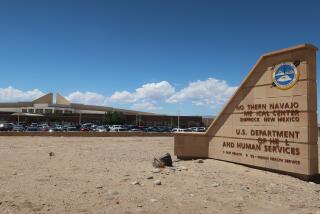Third World at Home
- Share via
The most expansive ghetto of the United States sprawls across 23,347 square miles of the American West, a vast poverty pocket lying within a short plane ride of the shiny Sun Belt city towers of Albuquerque, Salt Lake City, Phoenix and Denver. The Navajo nation can match many Third World countries in the litany of misery and despair: exploitation, broken promises, hunger and inadequate housing, schools and health care. Navajo unemployment is a conservative 40%, and as high as 70% in some areas. Thousands of Navajo homes lack such basics as running water and electricity.
But today the Navajo tribe is joining the intense national competition for private economic development under its newly elected chairman, Peter McDonald, the 57-year-old electrical engineer who led the Navajos during three controversial terms from 1971 to 1983. McDonald defeated incumbent chairman Peterson Zah by fewer than 800 votes out of 62,000 cast in last fall’s election. During his previous terms, McDonald won considerable attention by pursuing an OPEC-style approach to the development of the reservation’s considerable energy resources, but his administration also was plagued by accusations of mismanagement and fraud.
With the Western energy economy in depression, McDonald now is after high-tech and defense industries to locate on the reservation, enticing them with promises of a stable work force, a streamlining of tribal bureaucracy, the availability of natural resources and a variety of fiscal incentives. Aided by outside consultants, McDonald is appealing to corporate America on the basis of advantages to them and not out of pity or compassion for the Navajo.
This is not a traditional approach for one of the country’s most isolated reservations. But, as McDonald has noted, “The traditional Navajo values do not include poverty.”
McDonald does want concessions from the tribe’s federal custodians, but in terms of achieving independence and not just more guilt-soothing welfare. Congress should quickly accommodate this appeal by creating an economic-enterprise zone on the reservation that will make investment more attractive.
McDonald has moved to consolidate power in the chairman’s office, and there is every promise that his leadership will continue to create controversy. But nothing else has worked for the Navajo so far, and McDonald’s modern approach should be given a fair chance to work.
The chairman challenged American CEOs to view the Navajo as a modern, capable work force--not just as traditional weavers, silversmiths and herders. “You have seen what our people can do with their hands,” he said. “Now come discover what we can do with our minds.” That is a challenge worth accepting.
More to Read
Sign up for Essential California
The most important California stories and recommendations in your inbox every morning.
You may occasionally receive promotional content from the Los Angeles Times.










